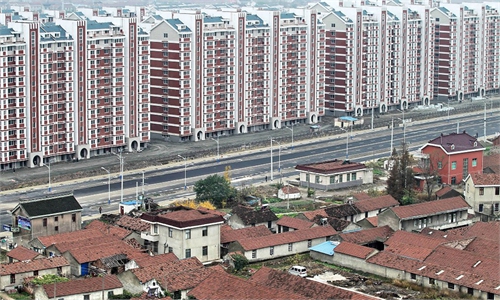China signals possible RRR cut, urges more loans to stabilize property market
Nation focuses on quick property market recovery

Cranes are seen at a construction site of a housing complex in Beijing. Photo: VCG
The State Council, China's cabinet, has signaled a possible cut in banks' reserve requirement ratio (RRR) at an opportune time, in an effort to ramp up financial support for the real economy.
The keenly followed monetary policy move will add to the central government's plan to send supervisory task forces to promote local implementation of pro-growth measures, and a fresh call from financial authorities to stabilize lending to property developers.
The multi-pronged push will assure the markets of ample liquidity at a time when the economy is navigating multiple headwinds, economic observers said, and they expressed hope for an upturn in activity.
Chinese Premier Li Keqiang on Tuesday presided over a State Council executive meeting, which vowed more financial support for the economy, state broadcaster CCTV reported on Wednesday.
The country will use reserve requirement cuts and other monetary policy tools at an appropriate time to maintain reasonable and ample liquidity, according to the meeting. The Chinese cabinet also vowed to guide banks to surrender part of their profits to outstanding inclusive loans to small and micro-sized businesses, and step up support for debt insurance by private firms.
This kind of official message, which is often the prelude to a move by the central bank to lower RRR, is considered a further boost to the economy.
It would supposedly be a targeted reduction of RRR that begins this weekend, Tian Yun, a Beijing-based economist, told the Global Times on Wednesday.
The previous RRR reduction, a 25-basis point cut to financial institutions' reserve requirements, was in April when the central bank released about 530 billion yuan ($74 billion) in long-term capital.
The possible monetary move is needed to fend off liquidity woes, Tian remarked, citing the fallout of recent big swings in the bond market amid a wider gap between Chinese and US interest rates.
The US has continued an ambitious rate-hiking cycle this year, with six increases in interest rates so far this year. This was compounded by domestic financing needs, Tian said, expecting the RRR message to funnel optimism into the market.
The cabinet's Tuesday meeting stressed fully implementing a package of policies and follow-up measures to stabilize the economy and consolidate the foundation for a recovery.
A decision was also announced at the meeting to send supervision working groups to promote the local implementation of policy measures that have already been rolled out.
In addition, the meeting vowed to stabilize and increase consumption, support the sustained and healthy development of the platform economy, and ensure the smooth flow of e-commerce and express delivery networks.
The meeting stressed support for rigid housing demand and the needs of those upgrading, accelerating lending to guarantee housing delivery, and encouraging commercial banks to make new loans to ensure that the real estate market develops soundly.
Simultaneously, the central bank and the banking and insurance regulator on Wednesday issued a 16-point notice to ensure that the financial sector provides support for the steady and healthy development of the real estate market.
The notice reiterated that "houses are for living in, not for speculation" and vowed to implement a long-term mechanism for the real estate market, keep real estate financing within a reasonable and appropriate range, and safeguard the legitimate rights and interests of homebuyers.
The notice called for keeping bond financing basically stable, supporting high-quality developers in issuing bonds for financing, and encouraging credit increases to support developers that are basically healthy but facing short-term difficulties.
It also stressed stabilizing lending for real estate developers and treating all types of state-owned and private real estate enterprises equally; implementing differentiated housing credit policies based on different cities; supporting the rational extension of existing financing such as development loans and trust loans to ensure home delivery, and supporting quality real estate enterprises in merger and acquisition deals for distressed developers.
The RRR cut and the central bank's 16-point financial package have created a combination of measures that can inject more liquidity into the market, boost consumption and provide the lubricant for economic circulation, Hu Qimu, deputy secretary general of the digital-real economies integration Forum 50, told the Global Times on Wednesday.
The latest credit moves reflect commercial banks' efforts to actively implement China's 16-point plan to shore up the property sector, experts said.
Bank of Communications and Vanke Group on Wednesday signed a comprehensive strategic cooperation agreement to provide Vanke with 100 billion yuan of credit lines, Paper.cn reported.
Agricultural Bank of China on Wednesday signed cooperation agreements with five property developers - China Overseas, CR Land, Vanke, Longfor and Gemdale, the Securities Times reported.
The moves by the commercial banks showed that they are actively implementing the measures to shore up the property market, Yan Yuejin, research director at Shanghai-based E-house China R&D Institute, told the Global Times on Wednesday.
"It has a positive effect on further improving the financial situation of property enterprises and providing supplementary capital to the development, sales and operations of the companies," Yan said.



